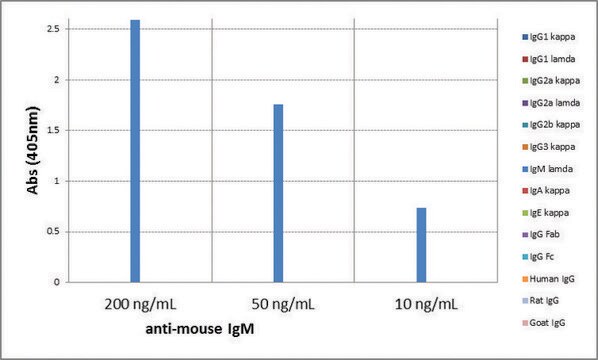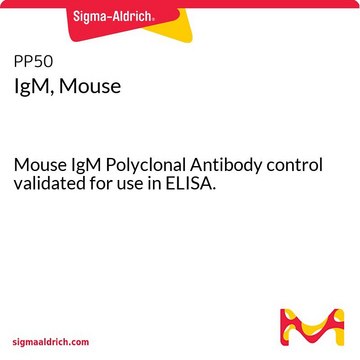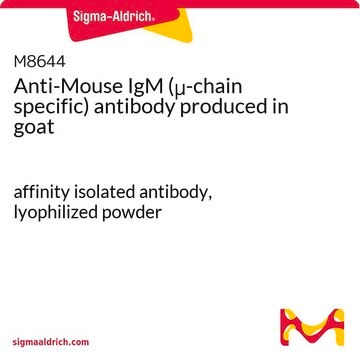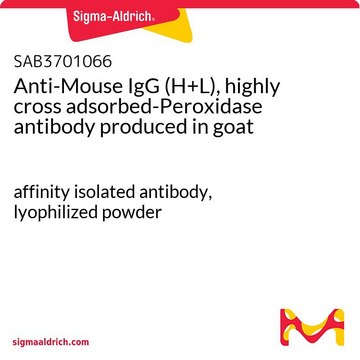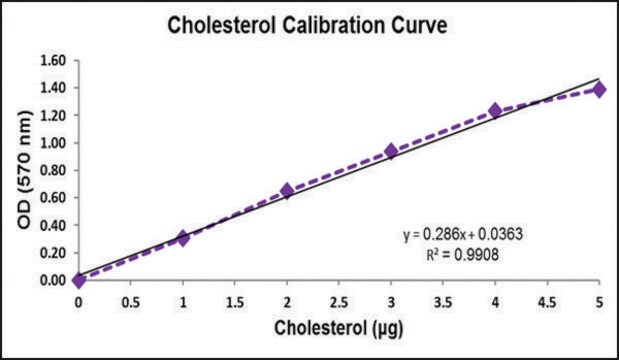MABC008
Mouse IgM Negative Control, clone GC323
Mouse IgM Negative Control Monoclonal Antibody validated for use in Flow Cytometry & Immunofluorescence.
Se connecterpour consulter vos tarifs contractuels et ceux de votre entreprise/organisme
About This Item
Code UNSPSC :
12352203
eCl@ss :
32160702
Nomenclature NACRES :
NA.42
Produits recommandés
Source biologique
mouse
Niveau de qualité
Clone
GC323, monoclonal
Fabricant/nom de marque
Chemicon®
Concentration
0.5 mg/mL
Technique(s)
flow cytometry: suitable
immunofluorescence: suitable
Isotype
IgM
Conditions d'expédition
wet ice
Modification post-traductionnelle de la cible
unmodified
Spécificité
This antibody reacts specifically with the outer membrane protein I component of various strains of Neisseria gonorrhoeae and does not react with any human cell surface component.
Immunogène
Protein I preparation of Neisseria gonorrhoeae.
Application
Research Category
Secondary & Control Antibodies
Epitope Tags & General Use
Secondary & Control Antibodies
Epitope Tags & General Use
Research Sub Category
Isotype Control Antibodies
Isotype Control Antibodies
The use of this antibody enables an estimation of non-specific binding of mouse monoclonal antibodies of isotype IgM to cell surface components in human blood and bone marrow. It is not suitable for use in immunohistochemical procedures.
SUGGESTED USAGE
The control antibody should be diluted to the same concentration as the test antibody, and equivalent volumes used. Flow cytometry and immunofluorescence - use 10 μl direct from the vial per 100 μl of whole blood, or 1 x 10E6 peripheral blood mononuclear cells (PBMC) in 100 μl buffer.
SUGGESTED USAGE
The control antibody should be diluted to the same concentration as the test antibody, and equivalent volumes used. Flow cytometry and immunofluorescence - use 10 μl direct from the vial per 100 μl of whole blood, or 1 x 10E6 peripheral blood mononuclear cells (PBMC) in 100 μl buffer.
Forme physique
Format: Purified
Purified from mouse ascitic fluid. The antibody is supplied in 0.5ml 25mM Tris HCl, 0.4M NaCl, pH 8.0, containing 0.2% bovine serum albumin and 0.1% sodium azide. The characteristics of each lot are tested by electrophoresis, specific immunofluorescence assay and flow cytometry.
Stockage et stabilité
Store at 2 to 8°C, for up to 6 months. For prolonged periods, store below -20°C in undiluted aliquots. AVOID REPEATED FREEZE/THAW CYCLES.
WARNING: The monoclonal reagent solution contains 0.1% sodium azide as a preservative. Due to potential hazards arising from the build up of this material in pipes, spent reagent should be disposed of with liberal volumes of water.
WARNING: The monoclonal reagent solution contains 0.1% sodium azide as a preservative. Due to potential hazards arising from the build up of this material in pipes, spent reagent should be disposed of with liberal volumes of water.
Informations légales
CHEMICON is a registered trademark of Merck KGaA, Darmstadt, Germany
Clause de non-responsabilité
Unless otherwise stated in our catalog or other company documentation accompanying the product(s), our products are intended for research use only and are not to be used for any other purpose, which includes but is not limited to, unauthorized commercial uses, in vitro diagnostic uses, ex vivo or in vivo therapeutic uses or any type of consumption or application to humans or animals.
Mention d'avertissement
Warning
Mentions de danger
Conseils de prudence
Classification des risques
Met. Corr. 1
Code de la classe de stockage
8B - Non-combustible corrosive hazardous materials
Classe de danger pour l'eau (WGK)
WGK 2
Point d'éclair (°F)
Not applicable
Point d'éclair (°C)
Not applicable
Certificats d'analyse (COA)
Recherchez un Certificats d'analyse (COA) en saisissant le numéro de lot du produit. Les numéros de lot figurent sur l'étiquette du produit après les mots "Lot" ou "Batch".
Déjà en possession de ce produit ?
Retrouvez la documentation relative aux produits que vous avez récemment achetés dans la Bibliothèque de documents.
Acceptance of embryonic stem cells by a wide developmental range of mouse tetraploid embryos.
Lin, CJ; Amano, T; Zhang, J; Chen, YE; Tian, XC
Biology of Reproduction null
Chih-Jen Lin et al.
PloS one, 9(9), e106916-e106916 (2014-09-12)
The ability of small molecules to maintain self-renewal and to inhibit differentiation of pluripotent stem cells has been well-demonstrated. Two widely used molecules are PD 98059 (PD), an inhibitor of extracellular-signal-regulated kinase 1 (ERK), and SC1 (Pluripotin), which inhibits the
Notre équipe de scientifiques dispose d'une expérience dans tous les secteurs de la recherche, notamment en sciences de la vie, science des matériaux, synthèse chimique, chromatographie, analyse et dans de nombreux autres domaines..
Contacter notre Service technique